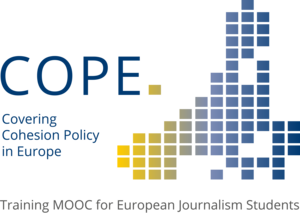
The digital content of the online course which is entitled “Covering Cohesion Policy in Europe – Training MOOC for European Journalism Students” (COPE) has been developed by 35 researchers from the following institutions: TU Dortmund University (Germany), AP Hogeschool (Belgium), the renowned organisation ARENA for Journalism in Europe, Aristotle University of Thessaloniki (Greece), Babeș-Bolyai University (Romania), the European Journalism Training Association (EJTA), University of Porto (Portugal) and the University of Wrocław (Poland).
In 14 Modules BA journalism students acquire knowledge, amongst other, on
- Basic knowledge – EU Institutions and Cohesion Policies
- Covering matters of EU and Cohesion Policy: The role of (local) media
- Journalistic skills and innovative concepts
- Practical application
This first version of the COPE MOOC is currently being implemented in English. The huge challenge of the biggest contemporary EU media project is to transfer the content into all other EU languages and to produce so-called “local windows” which provide perspectives on EU Cohesion Policy from the local angle of every EU country. Richard Brandt and Juliane Niepert, academic researchers at the Institute of Journalism at TU Dortmund University, supervise the translation process as well as the production of the “local windows”. Apart from the COPE consortium members, overall, 21 regional partners have taken the challenge and translated the English content into their specific national languages as well as produced the “local windows”.
The project partners are jointly creating an online course with 14 modules in English, which will then in turn be translated into the national languages of the European Union, firstly by the project partners themselves, and secondly by other universities and journalism schools from the other 21 EU countries, which will be commissioned with the translations.
Susanne Fengler states: “The project COPE is co-funded by the European Commission with one million euros and enables all universities in the European Union to train journalism students at Bachelor level with the same highest standards of journalism education while also highlighting relevant differences from the individual national perspectives.”
The implementation of the COPE project at the Faculty of Social Sciences of the University of Latvia will start in September.


 CONFERENCE
CONFERENCE